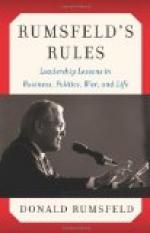When Warren crossed the river he found the western half of the crescent held by the enemy.
Whatever his original design, which may have been to take his whole force to Acton Homes, and then march eastward along the road, he had to drive the Boers from the plateau. His action was deliberate, without hurry, but without waste of time. The troops had been prepared for tactics better suited to their weapons, the bullet and the shell, to the enemy’s weapons, and to the ground, than the rapid advance and charge, which was the plan of earlier actions in this war. The view that the bullet should do its work before the appeal to the bayonet is made had at length asserted itself. Moreover, the need for method in attack had been recognised; first reconnaissance, then shelling; during the shelling the deployment of the infantry in extended and flexible order, then the musketry duel supported by the artillery; and then, as the infantry fire proves stronger than the enemy’s, an advance from point to point in order to bring it to closer and more deadly range; last of all, if and where it may be needed, the charge. These sound tactics—the only tactics appropriate to modern firearms—cannot be hurried, for to charge men armed with the magazine rifle and not yet shaken is to sacrifice your troops to their own bravery.
Warren’s attack then was rightly deliberate. On Friday, the 19th, he was reconnoitring and feeling for the enemy. On Saturday the shooting match began. It was continued throughout Sunday, and was not over on Tuesday. During these days the British were making way, gradually and not without loss, but steadily. There were, no doubt, pauses for renewing order, for reinforcing, and for securing the ground won. On Tuesday evening Spion Kop was still held by the Boers, who seem even then not to have been driven off the plateau, but to have been clinging to its eastern edge. On Tuesday night Spion Kop was taken. It was assaulted, probably in the dark, by surprise, and the Boers driven off. Even on Wednesday the Boers were tenaciously resisting the advance, making heavy attacks on Spion Kop and using their artillery with effect. At midnight between Wednesday and Thursday Sir Redvers Duller telegraphed home Sir Charles Warren’s opinion that the enemy’s position had been rendered untenable, and added his own judgment of the behaviour of the British troops in the words, “the men are splendid.”
All through the week Lyttelton’s brigade has been facing a force of the enemy on the eastern limb of the plateau in front of Potgieter’s Drift. He has not pressed an attack but has kept his infantry back, not pushing them forward to close range, but contenting himself with shelling the Boer positions.




